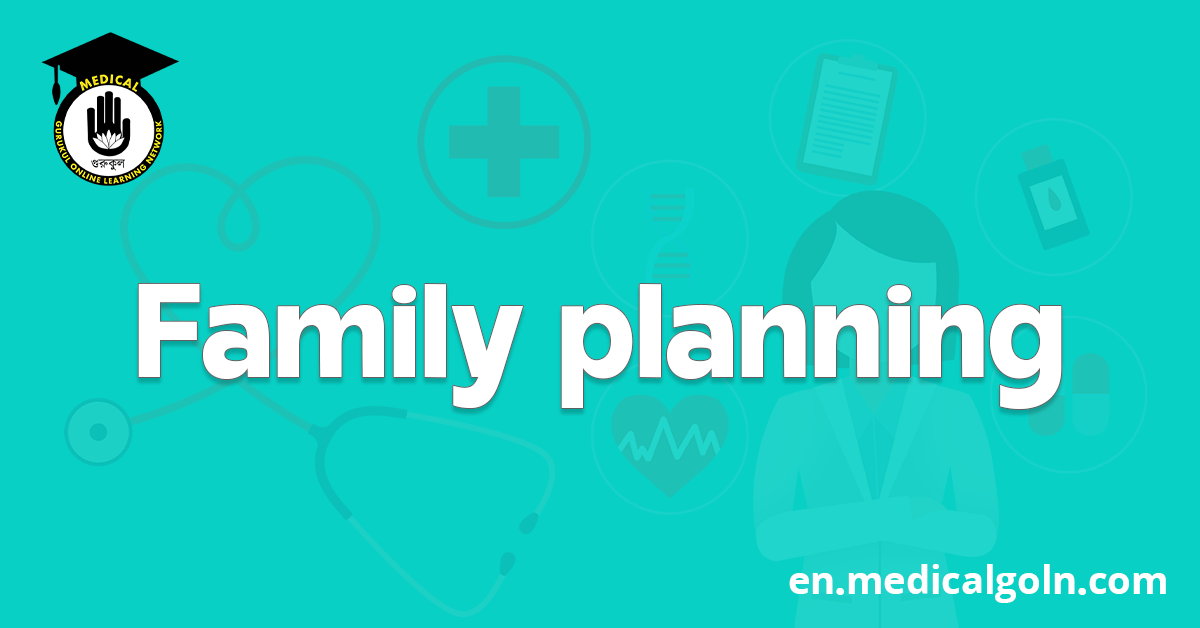Today is our topic of discussion Family planning
Family planning

Definition:
It is ‘a way of thinking and living that is adopted voluntarily upon the basis of knowledge, attitudes and responsible decisions by individuals and couples, in order to promote the health and welfare of the family group and thus contribute effectively to the social development of a country’.
Eligible couple:
An eligible couple refers to a currently married couple and the wife is in the reproductive age (15-45 years). They are called eligible because ‘they are in need of family-planning services’.
Target couple:
It implies to those couples who have had 2-3 living children and ‘family-planning
to such couple.
Family spacing or ‘birth spacing’:
Adequate interval between two consecutive child births. Normal family spacing: 3 years (average 3-5 years)
Objectives of family planning:
1. To avoid unwanted births
2. To bring about wanted births
3. To regulate the interval between pregnancies
4. To control the time at which birth occurs in relation to the age of the parent
5. To determine the number of children in the family
6. To reduce abortion.
7. To check over-population

Importance of ‘family planning’ in Bangladesh:
1. To reduce MMR: By reducing the number of pregnancies through family-planning.
2. To make pregnancy and delivery safer once women become pregnant.
3. To improve obstetric care.
4. To reduce unintended and unwanted pregnancies, which are more likely to end in induced abortion, and are less likely to receive adequate prenatal care than wanted pregnancies.
5. To target those at increased risk of maternal death, such as too young (20), too old (39), or multipara
(>5 previous births).
6. It induces responsible parenthood which results in harmony among family members and to decide the number of children they can support and take care.
7. Family-planning protects the health of the mother and the children.
8 To protect the health of the father as well, since it limits the responsibility of the father to support the family size he can only afford.
9 FP services can support the shortage of resources (e.g. land, money. water. crops, housing, health resources etc) in a developing country like Bangladesh.
Modern concept of family planning:
According to a WHO expert committee, family planning services include the followings –
1. The proper spacing and limitation of births oor
2. Advice on sterility
3. Education for parenthood
4. Sex education
5. Screening for pathological conditions related to genital tract (eg, PID, carcinoma cervix)
6. Genetic counselling
7. Premarital consultation and examination
8. To carry out pregnancy tests
9. Marriage counselling
10. Preparation of couples for arrival of first child
11. Providing services for unmarried mothers
12. Teaching home economics and nutrition
13. Providing adoption services
MCH – based family planning
Definition:
It is the integration of MCH and family-planning services where the delivery of both services is made through one unit.
MCH centers are the place where the mothers attend for antenatal, intranatal and postnatal care. Their husbands and children accompany them. So mothers and husbands can be better motivated towards FP. With this idea, concept of MCH-based family-planning has come out.

In MCH centers same groups of staffs look after the health of the mother, child and FP affairs. MO’s and SACMO’s deal with MCH services and FP services dealt with non-medical staffs. An MCH-based family planning program is an effective system for delivering family planning education and services to large populations in rural areas of Bangladesh.
See also :
